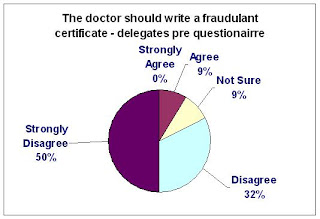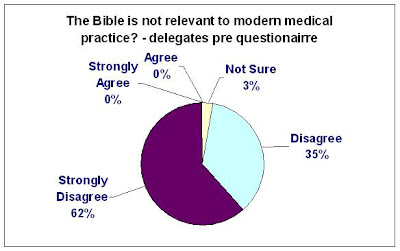The EMFI Great Mumbai Network hosted a marvellous conference our nation's 58th Republic Day called
Following the Master Physician's Heart: Ethics and Excellence in Medical Practice Today. An intense 2 months of getting the word out led to a total of 44 delegates and facilitators participating - of which 30 were doctors / dentists and medical students coming to the quiet greenery of the Gyan Ashram in Mumbai. The programme was supported by another 10 volunteers on site and many more who worked behind the scenes to make it possible.
We had three main sessions in the morning and then broke up into discussion groups in the afternoon where we applied what we had learned in the morning to ethical issues in abortion, end-of-life issues, integrity and serving the poor.
Some of the highlights: Dr. MC Matthew
Dr. MC Matthew (CMC Vellore) leading a time of reflection on Jesus ministering to the woman with the 12 year haemorrage - we were challenged to see that Jesus identified with the woman in her suffering and took her from her illness to wellness.
Dr. Ashok Chacko (EMFI Gen Sec.) gave a challenging biblical call to  healing. We were reminded of the Biblical call to: (1) Whole person care (2) Care for the poor (3) Not neglecting care in the pursuit of cure. Dr. Ashok finished off with a challenge for us to be good stewards of who we are (who are becoming vs what we have done) and the great task and great opportunities that are open for us.
healing. We were reminded of the Biblical call to: (1) Whole person care (2) Care for the poor (3) Not neglecting care in the pursuit of cure. Dr. Ashok finished off with a challenge for us to be good stewards of who we are (who are becoming vs what we have done) and the great task and great opportunities that are open for us.
Dr. MC Matthew also challenged us with Biblical view of life and death. He explored the words creation, formation and integration to describe the amazing beauty and value of life, while urging a humble participation by doctors in God's ongoing handiwork.
 Dr. Stephen Alfred (Lok Hospital, Thane) using his trademark wit and honesty explored what it means to be a Christ follower in a medical field rife with corruption and greed. Using his own experiences and building on the idea of obedience to God, he posed the challenge of following God within a corrupt world as being both necessary and possible - given God's grace to his children.
Dr. Stephen Alfred (Lok Hospital, Thane) using his trademark wit and honesty explored what it means to be a Christ follower in a medical field rife with corruption and greed. Using his own experiences and building on the idea of obedience to God, he posed the challenge of following God within a corrupt world as being both necessary and possible - given God's grace to his children.
The 'break-out' groups were lively and provided excellent times of reflection and discussion on key ethical issues that Christian leaders in health care face. Our featured speakers were joined by Dr. Adam Black, Dr. Sheba Eicher, Dr. Thomas Koshy, Dr. SP Matthew and Bro. Stanley Nelson in leading the 4 different groups exploring Abortion, End of Life Issues, Integrity and Reaching out to the Poor.

Before we knew it, Dr. MC Matthew was summarising the conference. He suggested that we could see the whole day's deliberations in three main headings:
1. Think EthicallyPaul tells us that whatever is good, excellent - that we should think on those things. It takes time for us to sift through and become Bible-centered. This is one reason why fellowship is so key: by coming together in meetings like this we are able to discover the largeness of God.
2. Practice GenerouslyWe realise that whatever we have, whoever we are - is not because of our own efforts alone, but by God's grace. We need to give back - lots! We need to practice our medicine in a wholeistic way that pays attention to the whole person. We also need to reach out to people even if they provoke us - God calls our generosity to include the table of forgiveness (which of course we received from Him in the first place).
3. Live ContentlyPaul speaking in Phil. 4.10 says that he has learned to be content in whatever the circumstances. We are tempted to cut corners - because we are not satisfied - and want more. If the Lord is really our Father, then we will learn Godly contentment - and the experience of knowing that He who promised is faithful.
------------------------
We are very grateful to the all our facilitators who so helpfully gave their time, experience and love to us all.We are also grateful to the EMFI for supporting Dr. Ashok's travel. We are very thankful that the Bethany Trust, Thane supported the lion's share of the conference expenses.We want to make a special word of thanks to the Conference Organising Team, and especially to the following volunteers who really worked hard and generously to make the whole conference a success: Dr. Geeta Paulmer, Dr. Robert Paulmer, Mercy Thomas, and James D'Costa.







 Almost two thirds of the church members surveyed (n=117) did not agree that the pregnancy should be terminated. About 1 in 10 were unsure, but just over a quarter agreed that the abortion should take place.
Almost two thirds of the church members surveyed (n=117) did not agree that the pregnancy should be terminated. About 1 in 10 were unsure, but just over a quarter agreed that the abortion should take place.

 The delegates responses (n=34) largely mirrored the church-goers with two thirds disagreeing with the removing the life support from this person. A quarter where not sure, while 1 in 8 agreed or strongly agreed to removing the life support. In comparison with church members - the same proportion of delegates supported withdrawing life support, but there were more who were not sure what their stance was.
The delegates responses (n=34) largely mirrored the church-goers with two thirds disagreeing with the removing the life support from this person. A quarter where not sure, while 1 in 8 agreed or strongly agreed to removing the life support. In comparison with church members - the same proportion of delegates supported withdrawing life support, but there were more who were not sure what their stance was. Almost 80% of the church members surveyed (n=117) considered it wrong for the doctor to write the certificate for a child who was clearly not sick but whose parents wanted to attend a Christian meeting. It is interesting to note, however, that almost 1 in 5 church goers surveyed felt that it was right for the doctor two write out a medical certificate.
Almost 80% of the church members surveyed (n=117) considered it wrong for the doctor to write the certificate for a child who was clearly not sick but whose parents wanted to attend a Christian meeting. It is interesting to note, however, that almost 1 in 5 church goers surveyed felt that it was right for the doctor two write out a medical certificate.
 Just over half of the church members (n=117) felt the charitable hospital was wrong to send the patient to the government hospital for the emergency procedure. A third, however, agree with the hospital's decision.
Just over half of the church members (n=117) felt the charitable hospital was wrong to send the patient to the government hospital for the emergency procedure. A third, however, agree with the hospital's decision. The delegates were stronger in stating that the emergency procedure should be done at the hospital, with a full 3/4 of them disagreeing with the hospitals decision (n=34). The remaining quarter of the delegates were split between those who agreed with the hospital managment and those who were not sure.
The delegates were stronger in stating that the emergency procedure should be done at the hospital, with a full 3/4 of them disagreeing with the hospitals decision (n=34). The remaining quarter of the delegates were split between those who agreed with the hospital managment and those who were not sure.  A quarter of the church members felt that abortion was right in this case (n=117). If the ones who are not sure are included the proportion goes up to 1/3.
A quarter of the church members felt that abortion was right in this case (n=117). If the ones who are not sure are included the proportion goes up to 1/3.
 While the majority of church goers (n=117) disagreed with the statement, an interesting minority did not. One in five church members felt that the Bible was not relevant for medical practice. When the people who are not sure are added to this number, we see that almost a third of the members feel the Bible is not relevant for medical issues.
While the majority of church goers (n=117) disagreed with the statement, an interesting minority did not. One in five church members felt that the Bible was not relevant for medical practice. When the people who are not sure are added to this number, we see that almost a third of the members feel the Bible is not relevant for medical issues.




